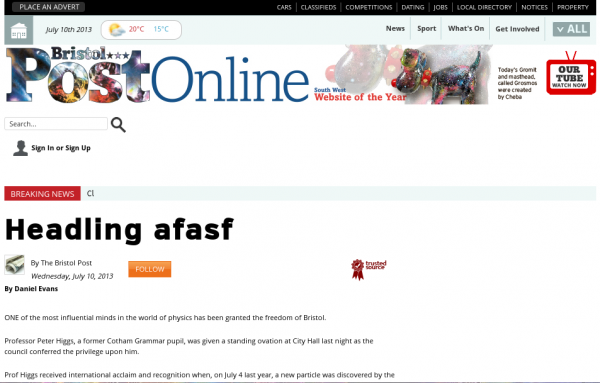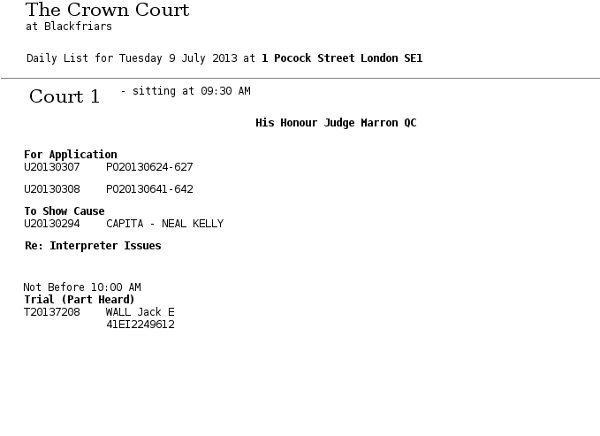Bristol Post Balls 3 – everyday sexism
The Bristol Post’s gaffes are not restricted to its website and dead tree version.
Yesterday its Twitter feed yielded the following bit of everyday sexism (and no apology when challenged. Ed.).

The Bristol Post’s gaffes are not restricted to its website and dead tree version.
Yesterday its Twitter feed yielded the following bit of everyday sexism (and no apology when challenged. Ed.).

The other afternoon I was having a rare afternoon pint in the shady garden of The Volunteer Tavern in St Judes when mine host Peter Gibbs asked me a question along the lines of: “What are these small brown birds I keep seeing in the garden?”
I told him that I’d frequently seen (and heard; as the RSPB remarks, “For such a small bird it has a remarkably loud voice.” Ed.) wrens in the garden.

The wren is Britain’s smallest bird, measuring 9.5-10 cm, and used to feature on the back of Britain’s smallest coin – the pre-decimal farthing, which ceased to be legal tender after 31st December 1960.

Despite its small size, the wren has a big binomial name: Troglodytes troglodytes.
The wren is found across the UK in a wide range of habitats – woodland, farmland, heathland, moorland and islands and is a regular visitor to gardens, including pub gardens in central Bristol.
In European folklore, the wren is named the King of the Birds. According to a fable attributed to Aesop by Plutarch, when the eagle and the wren strove to fly the highest (presumably for the title of King of the Birds. Ed.), the wren initially rested on the eagle’s back and then when the eagle tired, the wren took off from his back, soared above him and so won the accolade.
Below is a screenshot of the story in today’s Bristol Post reporting on Professor Peter Higgs – one of the team that postulated the existence of the particle named after him back in the 1960s – being granted the freedom of the city of Bristol.

Professor Higgs is a former pupil of Bristol’s Cotham Grammar School.
For a local media report of the event that has a proper headline, I recommend Bristol 24/7’s offering.
Bristol & Avon Family History Society has some interest background information on the history of the Freedom of Bristol and Burgesses, as Freemen (and they were men in medieval times. Ed.) were originally known.
Reposted from RPSI Linguist Lounge, with added links.
Anonymous writes:
You might be aware that Capita acquired the Fire Service College, the award-winning leader in fire and emergency response training, for £10 million. The Fire Service College, located in Moreton in Marsh – Gloucestershire, gets clients from all over the world, including: the UK, Europe, Middle East and Asia.
Some of their delegates can’t speak in English, so therefore Capita has tried improving their Fire Service College by bringing their very own, cheap, ‘Interpreters’ to assist the delegates.
So now, as you can see, the court ‘Interpreters’ which work for Capita are now being sent to the Fire Service College, to interpret for the delegates who are being trained for emergency response; I just hope they can interpret accurately.
Anyway, Capita called me up and offered me a 3 month interpretation project at the Fire Service College before it was actually official that Capita had acquired the College. I gave it a go, but I didn’t really like it because it was actually quite hard compared to Court Interpreting but it actually looked like Capita hired their best interpreters which have been on the NRPSI.
However, Capita had told me that I had to arrive the night prior to the day I interpret for the delegates. So, it becomes clear that Capita don’t trust its interpreters and know that they are unreliable.
Now let’s get to the interesting part, the rates. The normal day is 8:30 to 17:30 with a 1 hour lunch at about 12:00, so for the day (8 hours of full interpreting) you just get paid a flat fee of £140. That’s the amount of 7 hours interpreting in a court. But what was different was that they paid me door-to-door travel time and of course millage [sic].
Therefore, Capita pay you less, for harder work.
But on the other hand, Capita do give you free accommodation (which is on-site but not nice at all), they also give you free food; including breakfast, lunch and dinner. Also, there is a bar, gym, swimming pool and some small shops.
It does look quite appealing, doesn’t it? But it does mean leaving your family for 5 days in the week and giving you only 2 days (Saturday and Sunday) to go back home and spend it with your loved ones.
If any of you, Interpreters, have been to the Fire Service College, please leave a comment.
Many thanks.
As the screenshot below shows, Capita, that paragon of outsourcing efficiency, is due to appear at 9.30 at Blackfriars Crown Court in London before His Honour Judge Marron QC regarding “Interpreter Issues”, presumably the failure of Capita Translation & interpreting to fulfil its courts and tribunals interpreting contract with the Ministry of Justice (posts passim).

Update: 10.00 am.Peter Shortall has just commented as follows on the RPSI Facebook page:
Just left Blackfriars CC. It’s being heard in chambers, so I and a lady who had turned up to watch were asked to leave so the judge could talk to the Capita rep privately. So much for transparency!
Peter also added in an earlier comment that Neal Kelly is Capita’s “relationship manager” who handles “high-level complaints”.
 At the end of last week, The Document Foundation blog announced the call for papers for the 2013 LibreOffice Conference, which will be held from 25th to 27th September at the Department of Computer Science of Milan State University in Italy.
At the end of last week, The Document Foundation blog announced the call for papers for the 2013 LibreOffice Conference, which will be held from 25th to 27th September at the Department of Computer Science of Milan State University in Italy.
The Document Foundation is inviting members and volunteers to submit proposals for papers and wants to hear from people, whether they are seasoned presenter or just have something interesting to share about LibreOffice.
The Call for Papers page is available at: http://conference.libreoffice.org/2013/en/call-for-papers.
Proposals should be submitted by 4th August 2013 to guarantee their consideration for inclusion in the conference programme. Detailed instructions on how to file proposals are available at: http://conference.libreoffice.org/2012/archive/support-information. These instructions should be followed carefully.
The conference programme will be based on the following tracks:
Presentations, case studies and technical talks will discuss a subject in depth and be 30-45 minutes long (including Q&A). Lightning talks will cover a specific topic and will last 20 minutes (including Q&A). Workshops and panels will last longer (but should not exceed 90 minutes) and will discuss a topic or an issue. Sessions will be streamed live and recorded for download.
“What’s that Gromit, people have been visiting Lawrence Hill to see you in your Lodekka livery, looking like an old-style Bristol Bus Company bus in British racing green?”

“Cracking!”
Here in BS5, we’re very pleased to have one of the Gromit sculptures placed around the city as part of Gromit Unleashed – a public art exhibition in which giant sculptures of Gromit, decorated by invited artists, have been unleashed on the streets of Bristol and the surrounding area.
At the end of the art trail, the sculptures will be auctioned to raise funds for Wallace & Gromit’s Grand Appeal, the Bristol Children’s Hospital charity.
Transport Extra reports that our friends at Capita (posts passim) have lost a contract with a term of 5 years, an option on a further 2 years and worth £100 mn. just eighteen months into the contract.
The contract was with the DVLA and concerned vehicle excise duty enforcement.
The contract has now been awarded to rival outsourcing outfit NSL.
Well done Crapita. How much longer before you lose the courts interpreting contract with the Ministry of Justice? Let’s face it, you’ve been under-performing on that one ever since you took over the under-performing ALS (subsequently rebranded as Capita Translation & Interpreting. Ed.)?
Originally posted on Bristol Wireless yesterday.
 Following recent revelations about massive extent of telecommunications and internet traffic surveillance carried on by the USA’s NSA and the UK’s GCHQ (news passim), revelations have now emerged in Le Monde, one of France’s leading national newspapers.
Following recent revelations about massive extent of telecommunications and internet traffic surveillance carried on by the USA’s NSA and the UK’s GCHQ (news passim), revelations have now emerged in Le Monde, one of France’s leading national newspapers.
In a post today entitled “Revelations about the French Big Brother”, Le Monde reveals that France has a large scale snooping apparatus. The DGSE, the French secret service, is systematically collecting the electromagnetic signals emitted by computers or telephones in France, as well as the traffic between the French and abroad: all of the French population’s communications are spied upon. French politicians are aware of this, but secrecy is the rule: this French Big Brother is clandestine and evades all control.
What the intelligence service is looking is the metadata; their aim is to know who is talking to whom, allegedly to piece together the links between targets and thus to identify “cells”. The DGSE is thus collecting data on millions of telephone subscribers, plus emails, text messages, faxes, etc., plus all internet traffic sent to the likes of Google, Facebook, Microsoft, Apple, Yahoo, etc. The apparatus is alleged to be invaluable for fighting terrorism, but also enables snooping on anybody.
The DGSE is therefore collecting billions of items of data which are compressed and stored in Paris on three floors in the basement of its headquarters on the boulevard Mortier. The intelligence service has a supercomputer capable of handling tens of millions of gigabytes, according to Le Monde.
Other French intelligence services have fully discretionary access to this enormous database; this is termed the “pooling infrastructure”. Certain information can even be used by the police under the cover of “anonymous information”.
French law has made no provision for the bulk storage of technical data by the secret services. “For years we’ve had virtual authorisation,” one old intelligence services boss confides, “and each agency is happy with it.” A French parliamentarian confirms “that a large part of the electronic communications network in France is actually intercepted and [the data] stored by the DGSE”.
However, officials deny that the “pooling infrastructure” actually exists.
It’s always a good idea to keep one’s ears open walking around the city – or anywhere for that matter.
Yesterday lunchtime when crossing St Philips Bridge (below) my ears heard a real treat – a peregrine falcon in the heart of Bristol.


I’ve seen peregrines before near Bristol, particularly down the Avon Gorge, where I’ve spotted them nesting in the Gorge’s old quarries, but never before in the heart of the city.
Naturally, I was quite excited by this and asked Bristol’s Twitter users how unusual this was. After a couple of hours, I received a reply from naturalist and broadcaster Ed Drewitt, who informed me there was a “family of 3 chicks around Cabot Circus way” (they might help keep the city centre’s gull and feral pigeon population under control. Ed.).
Around my home patch of Easton I have over the years seen both sparrowhawks and kestrels, whilst moving further afield the patchwork of open grassland and woodland on Purdown and Stoke Park is ideal buzzard territory.
Finally, there’s one bird of prey I believe I’d heard that I’d really love someone else to corroborate. Returning home some years ago, I could have sworn I heard a tawny owl hooting in the vicinity of the railway embankment between Stapleton Road and Lawrence Hill railway stations. If anyone else has heard hooting there too, I’ll know I wasn’t imagining things.